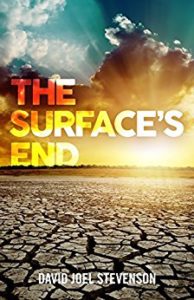The Surface’s End by David Joel Stevenson is a post-apocalyptic sci-fi that follows teenager Jonah Whitfield, a hunter living in a small town at the edge of the Deathlands. Even though his hometown is full of lush greenery, the Deathlands nearby are a desert wasteland stretching on for what seems like eternity, with an unnaturally sudden change between the two.
While out hunting one afternoon, Jonah’s prey darts into the Deathlands, and he follows, stumbling upon a hatch in the ground. He returns over the next week, drawn to the curious hatch, and finally manages to open it, revealing a tunnel down into the ground.
 The beginning of the book starts out a bit slow. We get a lot of details about Jonah’s family, his town, and some hints as to what happened in the past that our modern way of life no longer exists. Despite being post-apocalyptic, Jonah’s life is actually pretty great. He has a loving family, the world has not descended into anarchy despite the lack of established government, nor is there a dystopian government ruling over everything with an iron fist (at least, not in his world).
The beginning of the book starts out a bit slow. We get a lot of details about Jonah’s family, his town, and some hints as to what happened in the past that our modern way of life no longer exists. Despite being post-apocalyptic, Jonah’s life is actually pretty great. He has a loving family, the world has not descended into anarchy despite the lack of established government, nor is there a dystopian government ruling over everything with an iron fist (at least, not in his world).
I had a bit of a difficult time believing that society would have completely forgotten all about the world that came before the destruction that wiped out a good portion of humanity. Even if they no longer have working technology, they would still have books and left-over infrastructure, and I couldn’t imagine that people wouldn’t try to keep their knowledge of the past alive. However, we do only see a small portion of the world, Jonah’s hometown, which is pretty secluded, so it’s possible that this knowledge was kept alive in other locations.
The beginning is slow to give us a detailed sense of the “normal” world, at least from Jonah’s perspective. That way, we really feel how foreign the underground society he discovers is (though it may seem uncomfortably familiar in some ways). When Jonah descends into the hatch, he finds himself in a strange dystopian facility. At first he acts as an observer, hiding in small crevices and watching the family he comes across.
I will admit, this part was a bit cringe-worthy. Jonah immediately falls in love with the daughter in this family, Talitha, because she’s mopey and different from the others. Where they are all overweight and obsessed with their electronics, she is bored with her life and longs for a change. Again, I had difficulty believing that he would just happen to find a girl who dreams about the surface in his first descent into the hatch. Not only that, but he falls in love with her at first sight. I think the worst part, though, is that he watches her from afar for days, which is just creepy. At least he has the foresight to acknowledge that he’s being creepy and feel bad about it.
Jonah gets tired of being an observer and decides to try to enter their society so that he can meet Talitha in person. He bumbles his way through posing as an uneducated, lower-class worker getting a job hitting a button. I feel like this area is really where the book drew me in. Jonah doesn’t seem to have an untruthful bone in his body, and it’s interesting watching him try his hand at subterfuge. The best parts are the little details: the day after Jonah sneaks in for the first time, everyone in the facility gets sick because they haven’t been exposed to new germs in hundreds of years. When Jonah tries to hide amongst them, everyone immediately notices his smell. Jonah can’t figure out how to use the bathroom the first time, as he’s never had indoor plumbing (not to mention that everything—even the bathrooms—are computerized).
While Jonah’s world is really not bad for a post-apocalypse, Talitha’s epitomizes a dystopian society. The people living underground have been lied to into believing that the world above is dead, desolate, and filled with radiation. The leaders of their society know the truth, but they also know that if everyone discovered that they could leave, the first to go would be the working class, causing their societal structure to collapse. Because they don’t have access to naturally-growing plants and animals, everyone eats food substance (paste). Their government also uses technology to keep their people complacent while keeping an eye on everyone through the chips implanted in them at birth. Families can only have two children to avoid overpopulation, and after an elderly person has reached a certain age, they are killed for the same reason.
The book has no shortage of moral lessons, but they never feel heavy-handed. You could even classify this novel as Christian fiction, which normally I don’t care for, but in this case I enjoyed it, because it’s real Christianity, not “Republican Christianity.” The morals all come down to treating people, animals, and the environment with respect.
The scene that probably stuck with me the most was when Jonah stumbles upon the food-processing section of the facility, where animals are kept in tiny cages in the dark, stacked on top of one another and covered in each other’s feces, with tubes pumping food into them and blood out of them, each of them with dead eyes and no will to live. Jonah watches in horror as the animals are plucked up by a machine that mechanically separates them and turns them into food paste. There’s a reason I’ve personally avoided eating mechanically separated chicken, and this is it.
I think the history behind the facility is the most interesting part. Originally, it was intended as a utopian society, where everyone would be equal and classism would be done away with. However, many of the people who could actually afford to enter the facility pre-apocalypse were the rich and celebrities, who refused to accept a classless society. Then, outside citizens began attacking the facility’s entrances, so they launched nuclear weapons above the facility and at some abandoned cities. The purpose was twofold: get rid of the people trying to enter the facility and drive off those around it by wiping out any electronics, and show the footage of nukes devastating cities to prove to the people in the facility that the above-ground world had come to nuclear war like they’d been expecting. Except their plan sets of a chain reaction as other countries, suddenly believing America was launching nukes at them, began launching their own, starting a nuclear war. Honestly, it’s surprising that anyone or anything actually is still alive on the surface, but I guess this is a best-case scenario in the event of worldwide nuclear war.
The only place where I thought the book was a bit unbelievable in its religious message was that Jonah’s family would still practice Christianity. After all, we’ve established that all other previous facets of our modern culture have been lost, so why would any currently established religions still exist? That’s not to say that people would have no religion, but it would make much more sense for them to have a new, different religion influenced by the state of their world than a religion that is already 2,000 years old at present and has evolved drastically since its original creation. It would have made the most sense, this being set somewhere in the US, if there society had multiple aspects of various world religions, as the United States is not exclusively a Christian country. It felt a bit like having one’s cake and eating it too. Personally, I feel you can still have a Christian message without the name Christianity being used and the Bible still being read (especially when all other books about our present society seem to have mysteriously disappeared).
That being said, I found the book overall very enjoyable, especially the messages about respect for the environment and the warnings against nuclear war. The underground facility reminded me a lot of the vaults in the Fallout game series, and it was interesting to read a post-apocalypse where the main character discovers a dystopian society rather than coming from one. Towards the end we also get some of Talitha’s POV, which I think would have made the book even better if we’d gotten to read her side of the story earlier on, but I’m hoping that the sequel will let us see more from her eyes now that she has escaped to Jonah’s strange new world.
I’m also curious to see where the sequel takes this, as it’s become clear that the facility is not sustainable (in fact, the Deathlands near Jonah’s home are growing because the facility continues to leech resources from the above-world further in every direction). I think it would also be interesting to see the effects of Jonah and Talitha’s last-ditch effort to enlighten everyone to the above-world before their escape. Will the Facility have a revolution? Will some people even want to leave their predictable lives for that unknown world? I look forward to reading book 2, The Dirt Walkers.

